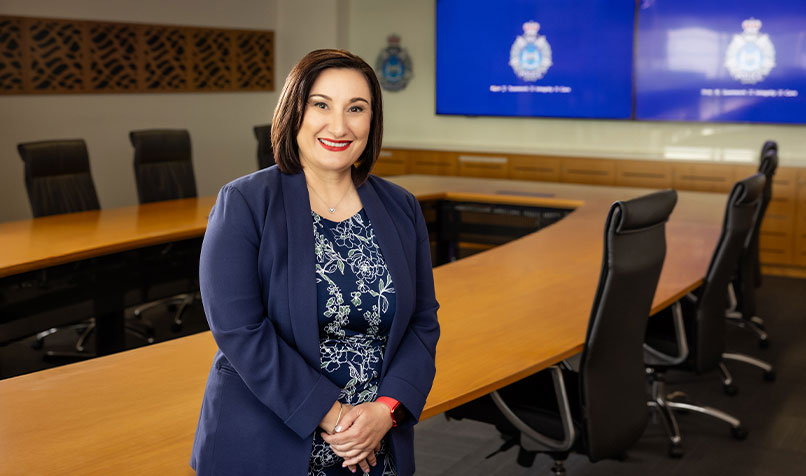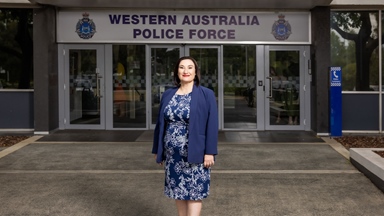Loading component...
At a glance
- Santa Cardenia FCPA joined the Western Australia Police Force in March 2001 and became CFO in 2016.
- Previously, she worked as a management accountant at the Western Australia Department of Housing.
- Cardenia manages a 125-strong team and a baseline operating budget of A$2.9 billion.
Note: Since this interview was conducted, Santa Cardenia has moved into the role of assistant director general, business and corporate services at the Department of Planning, Lands and Heritage in Western Australia. This article can be read as a reflection of her time as CFO of the Western Australia Police Force.
My role: Balancing the budget
I like to think of what I do as “the business behind the police”. All the front line needs to know is that when there is a call-out, they have the vehicle, the protection and all the equipment and accoutrements they need for effective policing.
I need to know their assets and equipment have been procured in a proficient and timely manner. It is all about delivering sustainable policing for the community.
In some ways I am a demographer. What does an area need, what are the population patterns and social changes occurring, and how can we supply those changes with an efficient policing service?
When we cost the number of officers, we always look at rank structure as well as concentration and deployment of officers. We will cost at certain percentages in metropolitan, regional and remote areas.
We have a baseline operating budget of A$2.9 billion. If we require more, we need to prepare a strong business case. This could be for sustainability funding to ensure increasing costs are met in the future, or we may need a new police station, a new or replacement plane or helicopter. It can vary.
These business cases can take six months to prepare and submit, and I oversee that process.
"The biggest challenge is building relationships. It is not enough to know your debits and credits and to work out your reconciliations. It is about relationships, working closely with operational areas and influencing governments."
I report to the commissioner and raise concerns where I see excessive expenditure, such as overtime. I raise such issues because there are financial implications and possible health and safety concerns. We need to ensure that policing resources are effectively deployed without officers burning out.
My role is about responding to changing pinch points. Examples can include changes in crime trends related to family violence, youth crime and organised crime. While working with the operational areas, I have to ascertain what this implies in material terms.
Ultimately, I need to know how to respond to change to deploy police and resources as quickly as possible for community safety. We have to be adaptable, and we have to be strategically intelligent about changing circumstances.
I need to balance the budget and identify where the pressure points might be for the agency. I cannot do this in isolation. I need operational input and it is all about front-line operations and the best outcomes for them and the community.
Top CFO skills for 2024
Game changers: Staying true to my values
After I finished my accountancy degree and the CPA Program, I realised that I wanted to help the community in a service delivery agency – either the police, education or the health sectors.
I put my hat in the ring as a level five financial management officer at the Western Australia Police Force because I felt it aligned with my values.
My belief that what I am doing serves the community keeps me going. It is simply about fulfilling the pact I made with myself – that I would stay true to my values and help the most vulnerable.
My challenges: Building relationships

When working in an operational agency, it can be challenging to educate and take stakeholders from outside of the agency along with you.
It is important to build relationships with other departments, such as the Department of Treasury and Department of Finance, so they can gain an understanding of what we do as an operational agency. That has taken time to develop.
The biggest challenge is building those relationships. It is not enough to know your debits and credits and to work out your reconciliations. It is about relationships, working closely with operational areas and influencing governments.
Being treated as an equal in the operational space makes such a difference. That has been my oldest and longest challenge, and I know I have surmounted it.
Professional relationship building for introverts
Lessons learned
- Make sure what you do aligns to your purpose and values: You will never go wrong by doing what you are passionate about. It will give you a sense of belonging and make a difference to others and yourself.
- Be prepared to work hard and engage in continuous learning: Whether it is developing technical skills, emotional intelligence or building relationships, persevere for self-improvement.
- Take opportunities that come your way: Despite fear and self-doubt, and even in difficult situations or when you think you are an imposter, give it a go – you might surprise yourself.
- Self-care: It is a marathon, not a sprint, so make sure you take time out to look after yourself. Do not forget to laugh every day and keep everything in perspective. Life is way too short not to.

